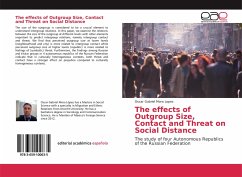This book examines the conflict theory of social control, particularly the threat hypothesis. It asserts that deviance and crime control are responses to social threats such as criminal acts and riots, and to people perceived as threatening such as minorities and the unemployed. The authors use threat hypothesis to organize the diverse literatures on social control, use new data to resolve crucial issues, and integrate current perspectives to develop the threat proposition. They analyze patterns of deviance and crime control ranging from fatal or lethal controls such as state executions or lynching, to physical restraint such as imprisonment, to beneficient controls such as mental health hospitalization and even welfare.
Hinweis: Dieser Artikel kann nur an eine deutsche Lieferadresse ausgeliefert werden.
Hinweis: Dieser Artikel kann nur an eine deutsche Lieferadresse ausgeliefert werden.








